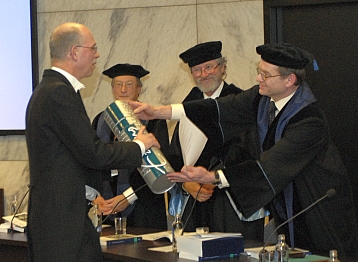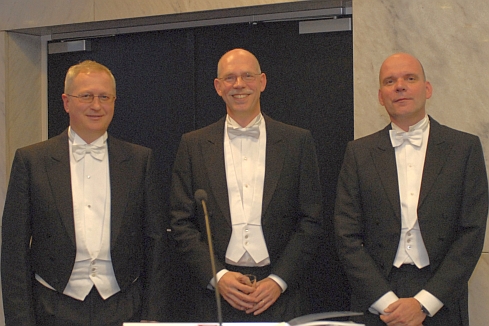Agricultural Innovation in Asia
On Thursday, January 15, Govert Gijsbers has defended his PhD thesis entitled “<link erim events _blank>Agricultural Innovation in Asia: Drivers, Paradigms and Performance”.
 This dissertation addresses the issue of agricultural innovation in Asia. Agricultural production and productivity in many Asian countries have grown rapidly over the past decades. Yet, important challenges are ahead. Growing incomes lead to rapid changes in consumption patterns: not only do people eat more food, they also demand more animal products and, fruits and vegetables. While demand is growing the resource base from which to feed a growing and more affluent population is declining: good agricultural land is lost to erosion, urbanization, industrial development and recreation.
This dissertation addresses the issue of agricultural innovation in Asia. Agricultural production and productivity in many Asian countries have grown rapidly over the past decades. Yet, important challenges are ahead. Growing incomes lead to rapid changes in consumption patterns: not only do people eat more food, they also demand more animal products and, fruits and vegetables. While demand is growing the resource base from which to feed a growing and more affluent population is declining: good agricultural land is lost to erosion, urbanization, industrial development and recreation.
For the future the challenge is to produce more with fewer resources (land, water, fertilizers, pesticides). This can only be achieved if agriculture becomes more innovative, and more knowledge intensive. The study analyzes four different innovation models, linked to four "revolutions" in Asian agriculture: the green revolution (starting around 1970), the sustainability revolution (1980s), the biotechnology revolution (1990) and the supermarket agri-food chain revolution (2000). These models or paradigms differ fundamentally in the nature of the innovation process, the actors involved, and the driving forces shaping the paradigm.
His promoter is <link people rob-van-tulder _blank>Prof.dr. R.J.M. van Tulder, Professor of International Business-Society Management, Rotterdam School of Management, Erasmus University Rotterdam. Other members of the Doctoral Committee are: Prof.dr.ing. T.W. Hardjono, Prof.dr. M.P. van Dijk, and Prof.dr.ir. R. Rabbinge.
Gijsbers’s PhD research project is conducted within the Erasmus Doctoral Programme in Business & Management, organised by ERIM. The Erasmus Research Institute of Management (ERIM) is the joint research institute of the Rotterdam School of Management (RSM) and the Erasmus School of Economics (ESE) at Erasmus University Rotterdam.
 About Govert Gijsbers:
About Govert Gijsbers:
Govert Gijsbers started working on agricultural innovation issues in 1976 when, as part of a research project at the Free University in Amsterdam he did field work in an ejido in central Mexico on the adoption of agricultural innovations. In 1978 he graduated with a Masters degree in regional development.
From 1979 to 1989 he worked for the United Nations in Sierra Leone, Honduras and Indonesia. In Sierra Leone he focused on regional development planning in a project based at the Ministry of Development and Economic Planning. In Honduras he participated in an integrated rural development project in the Aguán region, working with agricultural cooperatives and focusing on agro-industrial development projects. From 1985 - 1989 he was based in Bogor, Indonesia, where he worked for the UN’s Economic and Social Commission for Asia and the Pacific (ESCAP) at a research center that focused on agricultural diversification strategies through research on farming systems and secondary food crops.
In 1989 he returned to the Netherlands to take up a position at the International Service for National Agricultural Research (ISNAR), an organization committed to improving the performance of national agricultural research organizations in developing countries. He left ISNAR in 1992 to join the Netherlands Ministry of Foreign Affairs to start up a biotechnology for development program in Andhra Pradesh, India. Returning to ISNAR in 1996, he focused on agricultural research planning, on institutional development and on performance improvements in agricultural research organizations. From 2000-2003 he led a project on performance-based management, covering four countries: Indonesia, Pakistan, Sri Lanka and Vietnam. The assessments of organizational performance, staff performance, governance issues and linkages, undertaken in the context of that project form the basis for the present PhD project.
Following the demise of ISNAR in the Netherlands, he joined TNO, the applied research organization in the Netherlands, working with the Innovation Policy group. He is focusing on monitoring and impact assessment of innovation policies, the dynamics of research systems and knowledge infrastructures. At TNO he has led or participated in a number of multi-country EU studies and in projects in the Netherlands, Russia, and South Korea.
Abstract:
Agriculture in Asia has shown impressive advances over the last two decades. Yet, enormous challenges lie ahead. Rising food prices, climate change, the loss of agricultural land to erosion and urbanization and a growing and more affluent population will require continuous increases in productivity and improvements in sustainability. To answer those challenges Asian agriculture will need to become much more knowledge intensive and innovative. This study analyzes the theory and practice of agricultural innovation focusing on the nature of the innovation process, the forces that drive agricultural innovation, the core actors involved and the key techno-institutional innovations paradigms that have emerged. On the basis of this theoretical framework the study presents an analysis of agricultural innovation in four Asian countries: Indonesia, Pakistan, Sri Lanka and Vietnam, addressing the levels of the agricultural production system, the national innovation system, the public and private innovation actors and networks involved.
The study finds that four different techno-institutional paradigms can be distinguished based on four revolutions in Asian agriculture: the green revolution, the sustainability revolution, the biotechnology revolution and the supermarket revolution. These paradigms are based on four fundamentally different technologies, involve different actors and innovation networks and show different patterns of performance across Asia. To be effective agricultural research and innovation policies need to reflect the specific opportunities and constraints of the four techno-institutional paradigms.
More Information
Pictures of the Defense
Full Text of the Dissertation


